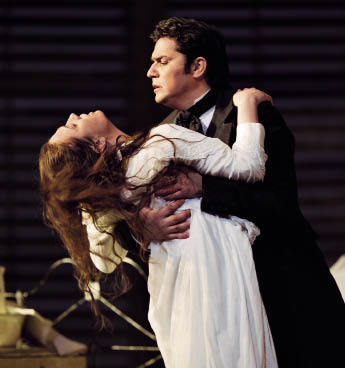La Traviata
Royal Opera House, in rep until 24 May; and with cast change 8 July to 17 July
This year, when operatic fare in the UK has become sparser and less adventurous than at any time since I remember, it’s no surprise that the old stand-bys should be wheeled out regularly. Top scorer in 2010, without question, has been La Bohème, with productions ranging from the brilliantly resourceful minimalism of The Cock in Kilburn, which has been running nightly since early December, to the elaborate squalors of the Royal Opera’s quarter-century-old production, which improves with every advance into decrepitude; with many other versions in between.
Some way behind, no doubt thanks partly to the taxing nature of the title role, is La Traviata, though the Royal Opera is loyal enough never to let a season go by without reviving it, and this season there are two runs, with different casts. So what people most like going to — assuming that that is the basis for the selection — is operas where you spend the evening watching, and more important, hearing a young woman die. That is hardly a new insight, and anyway the exciting sounds which expiring women make when awarded the poignant or heroic beauties of music have always been at the centre of this art form. Theories and speculations about why we find them such a turn-on have proliferated, without any of them achieving much plausibility, not even the ones that do the audience most discredit — I mean the views that we love torture of one kind or another so long as it looks and sounds exquisite.
My bewilderment about this whole subject was renewed, even refreshed, by the latest revival of Richard Eyre’s production of Traviata at the Royal Opera. Not only was I more moved by the work than I have ever been in the theatre — I didn’t see Callas, but from listening to the greatest of her recorded performances of the work, she is of course hors concours — but the piece went up drastically in my estimation. Two years ago, when Anna Netrebko sang Violetta in this production, and Jonas Kaufmann Alfredo, I was upset more than I had been before, but still spent much of the opera feeling angry with Violetta for yielding to the moral blackmail of Germont père. Netrebko was unable to sing most of the subsequent performances, and the young Albanian Ermonela Jaho took over. She is the Violetta in the current run, and her account has what I can only call an authenticity which none other I have seen possessed.
She doesn’t have a great voice, though it is quite beautiful and reliable, compact and capable of coping with Act I’s coloratura with no difficulty. What is outstanding is her gracefulness of movement, the expressiveness of the positions she adopts sometimes for long periods, and in general her conveying to me what I’m always being told great ballet dancers should, but it doesn’t happen: the way the character is feeling through economical gesture and stance. Besides that, she has a bold and individual reading of the part: this Violetta, though she is manifestly suffering more acutely from her tuberculosis from scene to scene, is also more angry about what is happening to her, and about the futility of her attempts to fight it. That means that by the time we get to the last act, even though tension has been virtually destroyed by yet another of Covent Garden’s protracted intervals, Jaho’s vivid acting and sensitive singing soon have us riveted, horrified by the rate at which she is dying.
A phrase which has always seemed to me one of Verdi’s most affecting comes when, towards the end, Annina hands Violetta a jacket, which she is too weak to put on, and she sings despairingly to Alfredo: ‘If your return doesn’t restore me, no earthly power can save me,’ before launching into the magnificent ‘Ah! Gran Dio morir si giovane’, Verdi’s most furious protest against death. That may all be obvious to lifelong Traviata admirers, but it has only just penetrated to me with full force, and thanks to this unemphatically superb impersonation.
Oddly, it is another Albanian, Saimir Pirgu, who sings Alfredo, and adequately. Neither father nor son inspired Verdi to music of his finest level, so much depends on the plausibility of Alfredo as a presence and actor, and Pirgu contrives to suggest an appealing youngster out of his emotional depth. Dmitri Hvorostovsky now doesn’t so much sing the role of Germont père as, in Adorno’s phrase in another context, a series of quotations from it. I have rarely seen and heard a celebrated performer so blatantly on autopilot. Apart from Jaho, the artist who showed how to make every little count was Robert Lloyd as Doctor Grenvil, a role he first sang here 35 years ago. Yves Abel is the good conductor, supporting the singers capably and getting moving accounts of the preludes from the orchestra.






Comments